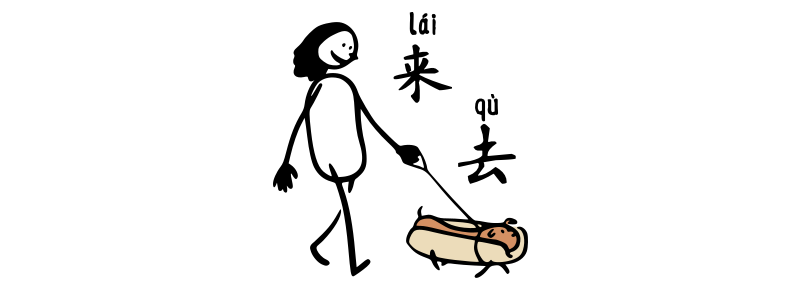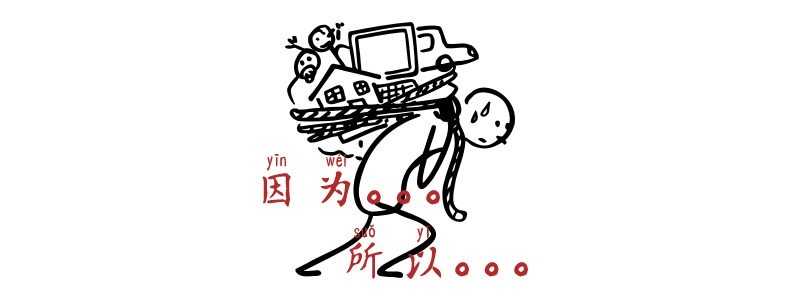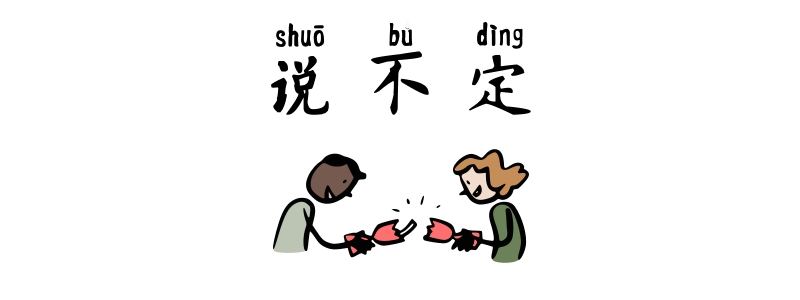Grammar Point:The Chinese word 否則则 fǒuzé means “otherwise.” Unlike 要不然 yàoburán, it carries a slight sense of threat or warning, as it implies that if a certain action is not taken or condition is not met, there will be consequences. Structure Condition + fǒuzé + Result 你nǐ先xiān做zuò完wán作業zuòyè,否則fǒuzé別bié想xiǎng看kàn電視diànshì你nǐ先xiān做zuò完wán作业zuòyè,否则fǒuzé别bié想xiǎng看kàn电视diànshìFinish your homework first, otherwise, forget about watching TV….
Author: tiffany
Showing Purpose with 来 lái
Grammar Point:The Chinese words 去 qù and 來来 lái are verbs that mean “to go” and “to come.” They are fundamental and commonly used words in the Chinese language, indicating movement from one place to another, such as going to a location, leaving a place, or traveling to a specific destination. In Chinese, you can…
Zero Pronoun
Grammar Point:In Chinese grammar, a zero pronoun (零代詞词 líng dàicí) refers to the omission of a pronoun when the context makes it clear what the pronoun would be. This is common in conversational Chinese and often occurs with personal pronouns like 我 (wǒ – I/me), 你 (nǐ – you), and 他/她/它 (tā – he/she/it). Structure…
Zero Pronoun in Chinese
Grammar Point:In Chinese grammar, a zero pronoun (零代詞词 líng dàicí) refers to the omission of a pronoun when the context makes it clear what the pronoun would be. This is common in conversational Chinese and often occurs with personal pronouns like 我 (wǒ – I/me), 你 (nǐ – you), and 他/她/它 (tā – he/she/it). Structure…
Chinese “consists of” – 由 yóu…组成 zǔchéng
Grammar Point:The Chinese phrase 由…組组成 yóu…zǔchéng is used to describe the composition or make-up of something. Structure S + yóu + Something + zǔchéng The 是 shì …的 de structure can be added to emphasize the composition or make-up of something in this grammar. 這zhè本běn書shū由yóu五wǔ個ge部分bùfèn組成zǔchéng这zhè本běn书shū由yóu五wǔ个ge部分bùfen组成zǔchéngThis book is composed of five parts. 這zhè個ge詞cí是shì由yóu兩liǎng個ge字zì組成zǔchéng的de这zhè个ge词cí是shì由yóu两liǎng个ge字zì组成zǔchéng的deThis word consists of…
有 yǒu – Existential Subject
Grammar Point:In Chinese, we use 有 yǒu to talk about the existence of something without specifying what it is. After 有 yǒu we describe what the thing does or is like. Structure 有 + (Number + MW) + N 有yǒu一天yìtiān有yǒu一天yìtiānOne day 有yǒu三sān隻zhī狗gǒu有yǒu三sān只zhī狗gǒuThere are three dogs. 有yǒu一個人yígerén來lái找zhǎo你nǐ有yǒu一个人yígerén来lái找zhǎo你nǐSomeone is coming to see you. 有yǒu天tiān你nǐ會huì知道zhīdào我的wǒde好hǎo有yǒu天tiān你nǐ会huì知道zhīdao我的wǒde好hǎoOne day you will…
Existential Subject with 有 yǒu
Grammar Point:In Chinese, we use 有 yǒu to talk about the existence of something without specifying what it is. After 有 yǒu we describe what the thing does or is like. Structure 有 + (Number + MW) + N 有yǒu一天yìtiān有yǒu一天yìtiānOne day 有yǒu三sān隻zhī狗gǒu有yǒu三sān只zhī狗gǒuThere are three dogs. 有yǒu一個人yígerén來lái找zhǎo你nǐ有yǒu一个人yígerén来lái找zhǎo你nǐSomeone is coming to see you. 有yǒu天tiān你nǐ會huì知道zhīdào我的wǒde好hǎo有yǒu天tiān你nǐ会huì知道zhīdao我的wǒde好hǎoOne day you will…
Sooner Then Expected with 就 jiù
Grammar Point:就 jiù has the function of indicating an occurrence that happened earlier or sooner than expected. It can also be used to express that something is going to happen in the very near future. Structure S + Time word + 就 jiù + V Function 1 – It indicates that something is going to…
Because & So
Grammar Point:The word “because” can be expressed as 因為为 yīnwèi in Chinese. While “so” is 所以 suǒyǐ. The structure of 因為为 yīnwèi……所以 suǒy…… is a common Chinese pattern used to express cause-and-effect relationships between two clauses. Structure 因為/因为 + reason + 所以 + result The pattern of 因為为 yīnwèi (because)⋯所以 suǒyǐ (so)⋯is common in both…
“Maybe” in Chinese – shuōbudìng
Grammar Point:說说不定 shuōbudìng is an idiom in Chinese that means “perhaps” or “maybe.” It is used to indicate uncertainty or possibility. Structure shuōbudìng + V 說不定shuōbudìng他們tāmen已經yǐjīng到dào了le说不定shuōbudìng他们tāmen已经yǐjīng到dào了leMaybe they have arrived. 明天míngtiān說不定shuōbudìng會huì下雨xiàyǔ,你nǐ最好zuìhǎo想xiǎng一個yíge備案bèiàn明天míngtiān说不定shuōbudìng会huì下雨xiàyǔ,你nǐ最好zuìhǎo想xiǎng一个yíge备案bèiànIt might rain tomorrow, so you’d better have a backup plan. 這zhè件jiàn事shì說不定shuōbudìng還hái會huì改變gǎibiàn这zhè件jiàn事shì说不定shuōbudìng还hái会huì改变gǎibiànThis matter might still change. 說不定shuōbudìng下xià個ge億萬富翁yìwànfùwēng就是jiùshì你nǐ说不定shuōbudìng下xià个ge亿万富翁yìwànfùwēng就是jiùshì你nǐYou might be the next millionaire. 晚餐wǎncān別bié等děng我wǒ, 我wǒ說不定shuōbudìng趕gǎn不bù回來huílái晚餐wǎncān别bié等děng我wǒ, 我wǒ说不定shuōbudìng赶gǎn不bù回来huíláiDon’t wait…







